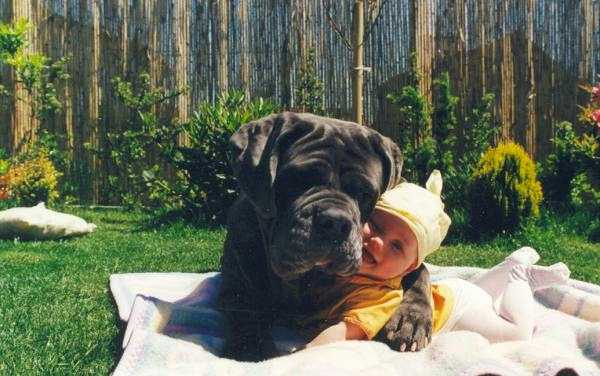The AKC Standard says the Siberian Husky “does not display the possessive qualities of the guard dog, nor is he overly suspicious of strangers or aggressive with other dogs.”
Indeed, the free-spirited Siberian Husky is usually good-natured with everyone.
He is also very playful, athletic, agile, and light on his feet. He loves the great outdoors and requires vigorous exercise, especially in cool weather. He should be taken running, hiking, and/or biking every day, always on-leash, for he is independent and born to run. If something catches his interest, he’ll be gone. Teaching him to pull carts and sleds gives him a purpose in life.
Without such exercise, mental activity, and lots of companionship, he can be incredibly, massively destructive.
Most Siberian Huskies are sociable with other dogs, but he has a very high prey drive and may destroy cats if not raised with them. Siberians should not be kept around rabbits, ferrets, or birds. Fencing must be high and secure, for he can be an escape artist, and once loose, he may run deer and molest livestock.
Training is a challenge because the strong-willed Siberian Husky is inclined to use his intelligence in clever ways that suit his own purposes. Use food rewards — jerking this breed can result in melodramatic theatrics, including screaming. Digging and howling are favorite pastimes.
Husky what’s good about them
If you want a dog who…
Is medium-sized and furry, with a wolfish appearance
Is free-spirited and playful
Is athletic and agile and loves the great outdoors, especially in cold weather
Thinks that running full-speed, pulling carts and sleds, and/or carrying a backpack on a mountain hike are his purposes in life
Is usually good-natured with strangers and sociable with other dogs
A Siberian Husky may be right for you.
If you don’t want to deal with…
Vigorous exercise requirements
Rowdiness and exuberant jumping, especially when young
Massive destructiveness and howling when bored, left alone too much, or not exercised enough
Strong instincts to chase and grab anything that runs, i.e. cats
Escaping from your yard in search of adventure
Strong-willed mind of his own, requiring a confident owner who can take charge
Heavy shedding
A Siberian Husky may not be right for you.
But you can avoid or minimize some negative traits by
choosing the RIGHT breeder and the RIGHT puppy
or choosing an ADULT dog from your animal shelter or rescue group – a dog who has already proven that he doesn’t have negative traits
training your dog to respect you
avoiding health problems
More traits and characteristics of the Siberian Husky
If I was considering a Siberian Husky, I would be most concerned about…
Providing enough exercise. Siberian Huskies MUST have regular opportunities to vent their energy. Otherwise they will become rambunctious and bored — which they usually express by howling and destructive chewing. Bored Siberian Huskies are famous for chewing through drywall, ripping the stuffing out of sofas, and turning your yard into a moonscape of giant craters.
Unless you specifically want an athletic dog for sledding, carting, backpacking, or other outdoor-related activities, preferably in a cool climate, I do not recommend this breed. Siberian Huskies were never intended to be simply pets. Trying to suppress their “hardwired” drive to work, without providing alternate outlets for their energy, can be difficult.
Bounciness. Young Siberian Huskies (up to about two years old) romp and jump with great vigor, and things can go flying, including people.
If you have small children, or if you or anyone who lives with you is elderly or infirm, I do not recommend Siberian Husky puppies. The temptation to play roughly is too strong in many young Siberian Huskies.
Strong chasing instincts. Most Siberian Huskies have strong instincts to chase and seize cats and other fleeing creatures, including deer and livestock. If anything goes wrong in the breeding, socializing, training, handling, or management of this breed, it is capable of seriously injuring or killing other animals.
To keep your Siberian Husky in, and to keep other animals out, fences should be high, with wire sunk into the ground along the fence line to thwart digging. Gates should have the highest quality locks. Many Siberian Huskies are clever escape artists who will go over, under, or through fences in search of adventure.
Stubbornness. Siberian Huskies are not Golden Retrievers. They have an independent mind of their own and are not pushovers to raise and train. They can be manipulative, and many are willful, obstinate, and dominant (they want to be the boss) and will make you prove that you can make them do things. You must show them, through absolute consistency, that you mean what you say.
To teach your Siberian to listen to you, “Respect Training” is mandatory. My Siberian Husky Training Page discusses the program you need.
Heavy shedding. Siberian Huskies shed a LOT. You’ll find hair and fur all over your clothing, upholstery, carpeting, under your furniture, on your countertops — even in your food. Frequent vacuuming will become a way of life. Make sure you’re REALLY up for this.
Noise. Unless you live way out in the boondocks and have no neighbors, Siberian Huskies should never be left outside in your yard, unsupervised. Their mournful howling will have your neighbors calling the cops to report the nuisance — or quietly letting your Siberian Husky out of his yard so he’ll wander away.

